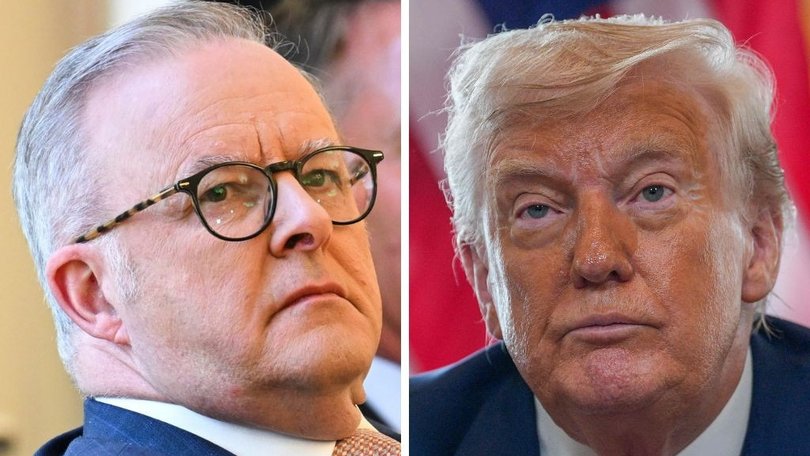Questions raised on Australia’s baseline tariff rate as Donald Trump’s deadline looms
With just hours to go until Donald Trump’s tariffs take effect, questions are being raised about how Australia will fare and if the 10 per cent baseline will be doubled.

With just hours to go until new US tariffs take effect, Treasurer Jim Chalmers has taken a swipe at Donald Trump, saying slugging import penalties on countries like Australia would be “bad for the American economy”.
In a last ditch effort, Dr Chalmers said imposing higher tariffs with nations — especially trade surplus-clad countries like Australia — would be an “act of economic self-harm” with the US economy already hit with rising inflation.
“We think these tariffs are bad for the American economy, certainly bad for the global economy,” he said.
Sign up to The Nightly's newsletters.
Get the first look at the digital newspaper, curated daily stories and breaking headlines delivered to your inbox.
By continuing you agree to our Terms and Privacy Policy.“We’re better placed and better prepared than most countries to deal with that, but we won’t be immune. We’ll continue to engage with the Americans on it.”
Dr Chalmers said his “working assumption” was that Australia would continue to have a 10 per cent baseline tariff after the August 1 deadline — which falls early-afternoon on Friday in Australia.
That is despite the US President hinting during his recent Scotland trip, that countries yet to strike a deal would be slapped with a 15 to 20 per cent rate.
“Our understanding and our working assumption is that we get the 10 per cent,” he said during a breakfast TV blitz on Thursday.
“From our point of view, the 10 per cent is too high.
“We think it should be zero because these tariffs are an act of economic self-harm.”
Dr Chalmers went on to claim that the Albanese Government was engaging with the Americans “all the time” when asked about the yet-to-be rescheduled first face-to-face between Mr Albanese and Mr Trump.
National’s leader David Littleproud, however, slammed the Albanese Government for running on assumptions and failing to engage with the US President ahead of the deadline.
“I don’t think we should be sitting here thinking there’s a certainty that we don’t be sitting at 10 per cent,” he said.
Since the tariffs were first proposed in April — their implementation has been delayed several times. It has prompted the nickname “TACO” — Trump Always Chickens Out.
The US president first announced the tariff regime on “Liberation Day” at the White House on April 2 but it was swiftly postponed for 90 days.
Perth USAsia Centre chief executive Professor Gordon Flake said Donald Trump’s unpredictability makes it difficult to take his statements or deadlines at face value.
He also suggested the deadline may not materialise tomorrow since Trump hasn’t repeated it and therefore might not follow through.
“Even for his supporters and his administration, his words don’t mean anything,” he said.
“Because you set the deadline, it doesn’t mean that there will be an across the board application… unless he specifically reemphasizes or restates that. We haven’t seen a repetition.
“It’s just ongoing capriciousness, Mad King whims, masquerading as strategy. It’s the whims and the emotions of a Mad King on a daily basis.”
Mr Littleproud also accused the Government of lifting the restrictions on US beef imports — potentially exposing Australia to mad cow disease and tuberculosis — as a concession made to appease Mr Trump.
“This is all because of a diplomatic failure by Prime Minister Albanese to be able to meet with President Trump,” he said.
“If you want to know about how you’re going to come and deal with Trump, you actually have to sit down with him.”
It comes after an independent inquiry proposed into Australia’s recent decision to allow further US beef import has been denied.
Put forward by Nationals Matt Canavan in the Senate on Thursday but voted down 33-27.
Nationals, Liberals, Independents Fatima Payman and David Pocock, and One Nation Senators had voted for an inquiry while Labor and Greens opposed it.
WA Senator and shadow assistant trade minister Dean Smith said Australia’s biosecurity wasn’t a bargaining chip and labelled any weakening of Australia’s good track record as “a dangerous and unnecessary risk”.
“The Prime Minister cannot get a meeting with President Trump, but has managed to give away access to our beef market without securing a trade deal for Australian producers,” he said.
“It is particularly disappointing that Labor and the Greens conspired today to block a Senate Inquiry into the biosecurity risk associated with this US beef imports decision.”
The Government said the decision to lift the import ban on US beef was based on science.
While Australia has allowed beef imports from the US since 2019, there has been a long-standing ban on US beef imports—specifically meat from cattle born in Canada or Mexico but slaughtered in America.
Agriculture Minister Julie Collins, Prime Minister Anthony Albanese and Trade Minister Don Farrell had said it came after a science-based biosecurity review and strict standards remained in place.
They argued the decision’s timing amid tariff threats wasn’t suspicious.
Professor Flake said he didn’t believe changes to beef imports would get Australia a better deal but perhaps shelter it from a worse one.
“We’re just trying to remove an irritant before it attracts the Eye of Sauron,” he said.
